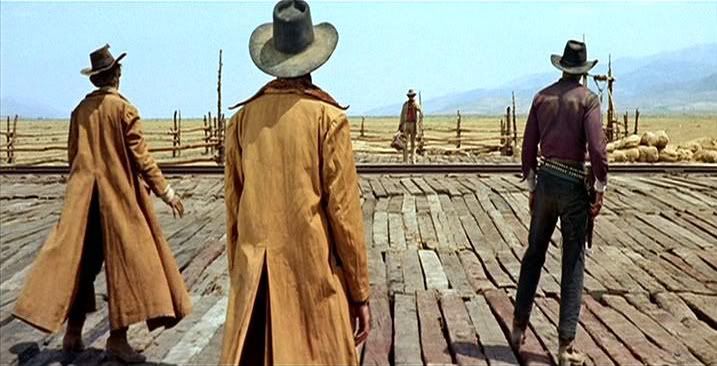
.:Film criticism by aesthetes for connoisseurs:.
| :: To search Sunset Blvd, use the Blogger bar at the top of the page :: |
| [::..resources..::] |
| :: imdb |
| :: box office mojo |
| :: foreign films |
| :: turner classic movies |
| :: british film institute |
| :: american film institute |
| :: culture vulture |
| :: screenwriter's utopia |
| :: screenplays |
| :: movie physics |
| :: auteur |
| :: the macguffin |
| :: strictly film school |
| [::..critics..::] |
| :: ebert |
| :: metacritic |
| :: rotten tomatoes |
| :: milk plus |
| [::..archives..::] |
:: 1.31.2005 ::
Something to Do With Death
For a long time I didn’t like westerns; they were too simplistic, too moralistic, too sentimental for my tastes. Then I discovered Sergio Leone, the Italian director best known for his spaghetti westerns starring Clint Eastwood. Leone loved westerns—he grew up watching them—and Once Upon a Time in the West (1968) is both an homage to those old Hollywood westerns and a ruthlessly unsentimental reinvention of the Western myth itself.
In the opening scene, Leone sets a pace that is somehow both leisurely and unbearably tense. Three dusty gunfighters arrive at an isolated, empty train station in the Arizona desert. They are waiting for something, and as they wait, the tension mounts and time crawls at an excruciatingly slow rate. Once Upon a Time in the West is a movie in which the score, composed by Ennio Morricone, plays an unusually significant role—the main characters even have their own themes—but there is no music (and no dialogue, either) in the opening sequence, just amplified natural sounds: a door banging, a windmill squeaking, a fly buzzing, knuckles cracking, water dripping. Then—finally—the whistle of an oncoming train.
And as the train pulls away, we see the first of four key characters—a nameless drifter (Charles Bronson) standing alone, drawing out mournful notes on a harmonica. This, it seems, is who the gunfighters have been waiting for. They draw their guns at last, but it’s the enigmatic newcomer who remains standing.

The scene that follows is even more fraught with tension, and the denouement is truly horrific. A family prepares for the homecoming of the patriarch’s new bride, but an ominous foreboding hangs over what should be a tranquil domestic scene. When shots finally ring out, it’s almost a relief. The brutal massacre of the family is over within seconds, and five men wearing dusters emerge from the sagebrush, faces concealed. Slowly, slowly, the camera pans up to the face of the gang’s leader, and when we first see the icy blue eyes of the killer (Henry Fonda), we know right away what kind of man he is—the kind who smiles as he shoots a child.
Next we see another train arriving—this one carrying the heartbreakingly lovely Jill (Claudia Cardinale), blissfully unaware of what has just happened to her new family and ready to begin her life on the frontier. When she realizes there is no one at the station to meet her, she finds a wagon to take her to her destination, a place in the middle of nowhere called Sweetwater. The wagon stops at a sprawling way station, where we meet the final key character, a dangerous yet boyishly charming bandit named Cheyenne (Jason Robards), who prowls in after shooting his captors.
Is he a hero, or is he a villain? What about the harmonica-playing loner, who turns out to be inside the way station as well, concealed in the shadows? And what has led these people to cross paths in the first place? What does it all mean? We don’t know yet, and we don’t learn for a long time. When we do find out—eventually, all is revealed—it’s not from the characters talking about themselves or each other. Leone was a director who knew that a facial expression is worth a thousand lines of dialogue, often bringing the camera up very close to the actors’ faces. Instead of words, words, words, the story emerges through expression and gesture, music and silence, sound and image.
The action unfolds in no hurry whatsoever, and each scene brims with fascinating detail. In Once Upon a Time in the West, time slows down; like the clock in one scene that’s missing most of its numbers, time even seems to cease existing altogether. This is simply not a movie for those seeking immediate gratification—but for the patient, an embarrassment of riches awaits.
:: Posted by Laurie @ 6:34 PM [+] ::
...